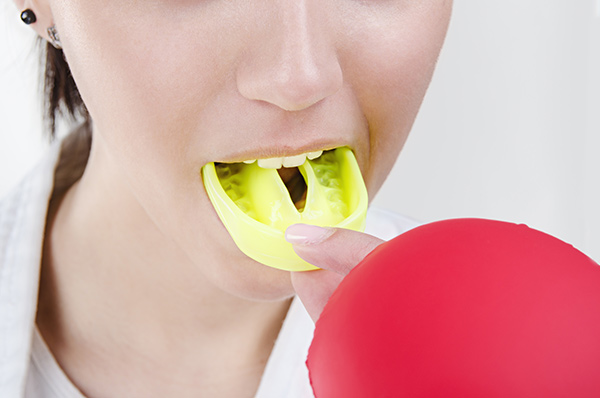
If you or your child plays sports, injuries are inevitable. While scraped knees and bruised arms quickly heal, damage to your teeth or gums can be cause for concern. Contact sports always require mouth guards, but other sports or activities like softball or riding a bike don’t. They can be just as dangerous for your dental health!
Finding the right mouth guard is important. Make sure it offers the protection and comfort needed to keep your mouth safe without discouraging you from wearing it. Learn about the three major mouth guard types and why they’re so important below.
Three Major Mouth Guard Types
#1 Stock Mouth Guards
These standard mouth protectors come ready-to-use the moment you purchase them. They’re typically the most inexpensive of the various mouth guard types. Because they are not fitted, most people find them to be uncomfortable. Stock mouth guards also tend to make breathing more difficult due to their bulky design.
Few dentists would recommend these unfitted mouth guards. Due to their stock design, they only offer a fraction of the protection offered by other mouth guards. However, if you have no access to a fitted mouth guard, they better than wearing no protection at all. Because of their inexpensive cost and availability, they’re good as an alternative if you lose your primary mouth guard and need a new one quickly.
#2 Mouth-formed Mouth Guards
Boil-and-bite mouth guards are one of the most common type of protection used by athletes. To prepare them, you boil them in water, rapidly cool them in cold water, and then place them in your mouth. You then either bite down or use your finger to apply pressure and form the impression. They work because of the special thermoplastic used in their design, allowing heat to make them pliable but becoming firm when in use.
The other type of mouth-formed guards are the shell-liner mouth guards. Like the boil-and-bite design, they provide a more comfortable and protective fit. They’re created by pouring an acrylic material into an outer shell, where it forms a lining. You then place it into your mouth to allow it to set and form the guard.
Boil-and-bite mouth guards are typically used for child athletes playing in team sports, as they are relatively inexpensive and offer more comfort than stock guards. However, like stock mouth guards, each of these mouth guard types only offer a bare-minimum of protection and still retain some of the bulky, uncomfortable qualities that make them unpopular to wear.
#3 Custom-fitted Mouth Guards
The most protective and comfortable mouth guards available are custom-fitted mouth guards created by your dentist. Made from a cast designed perfectly for your teeth, they fit better than any other mouth protection you can buy at the store. To make them, your dentist will make an impression of your teeth and a dental lab technician will create the custom-fitted guard.
Not only do custom mouth guards protect your teeth, they also offer better protection from falls or strikes to the chin, making them ideal for boxing or martial arts. If you or a family member is planning to start playing sports or participate in other types of physical training, contact us to schedule an appointment to get your custom-fitted mouth guard!
Risks Associated with Not Wearing Your Mouth Guard
It’s difficult to quantify the specific risks involved with not wearing a mouth guard, as each sport involves its own unique levels of risk. However, a study on common dental injuries in athletes found that over five million teeth are avulsed each year, meaning complete dislocation, costing nearly $500 million in healthcare costs. The highest risk sports for dental injuries are football, hockey, boxing, basketball and martial arts.
One interesting discovery is that basketball athletes were up to five times as likely to suffer dental trauma than football athletes. This is likely due to football requiring mouth guards, whereas basketball leaves them optional. It’s a great example of the importance of mouth guards even in non-contact sports; accidents happen and they’re difficult to avoid. Without proper protection, a collision or fall can cause considerable damage that a mouth guard would have been able to prevent.
When you wear a mouth guard, you prevent major dental trauma that could have lasting impact long after the injury. For instance, losing permanent teeth, especially for children, can impact the development of a health bite or even their speech.
Proper Mouth Guard Care
Not unlike taking care of a retainer, all mouth guard types requires a little bit of maintenance to keep them clean and safe to use. Even the cleanest mouths are loaded with bacteria, which is why daily brushing and flossing is so crucial to your dental care routine. Without proper care, bacteria will build up in your mouth guard, which may require you to replace it.
There are two major parts of proper mouth guard care. The first is to always brush and rinse your teeth before and after wearing your mouth guard. This reduces the bacteria that could transfer between your mouth and the mouth guard. The second part is to always clean and store your mouth guard in a proper container. Don’t forget to dry it completely before putting it away, either!
Do You Need a Custom-Made Mouth Guard? Schedule an Appointment Today!
Pointe Dental Group can provide you with a complete examination, answer your questions, and discuss your options. Schedule an appointment with us today! New patients can receive FREE comprehensive exam and consultation, plus a full panoramic x-ray with a paid cleaning procedure (a $200 value)!
Grosse Pointe Farms: (313) 881-2480
Shelby Township: (586) 803-8300
Don’t miss a thing! Connect with us on Facebook!
